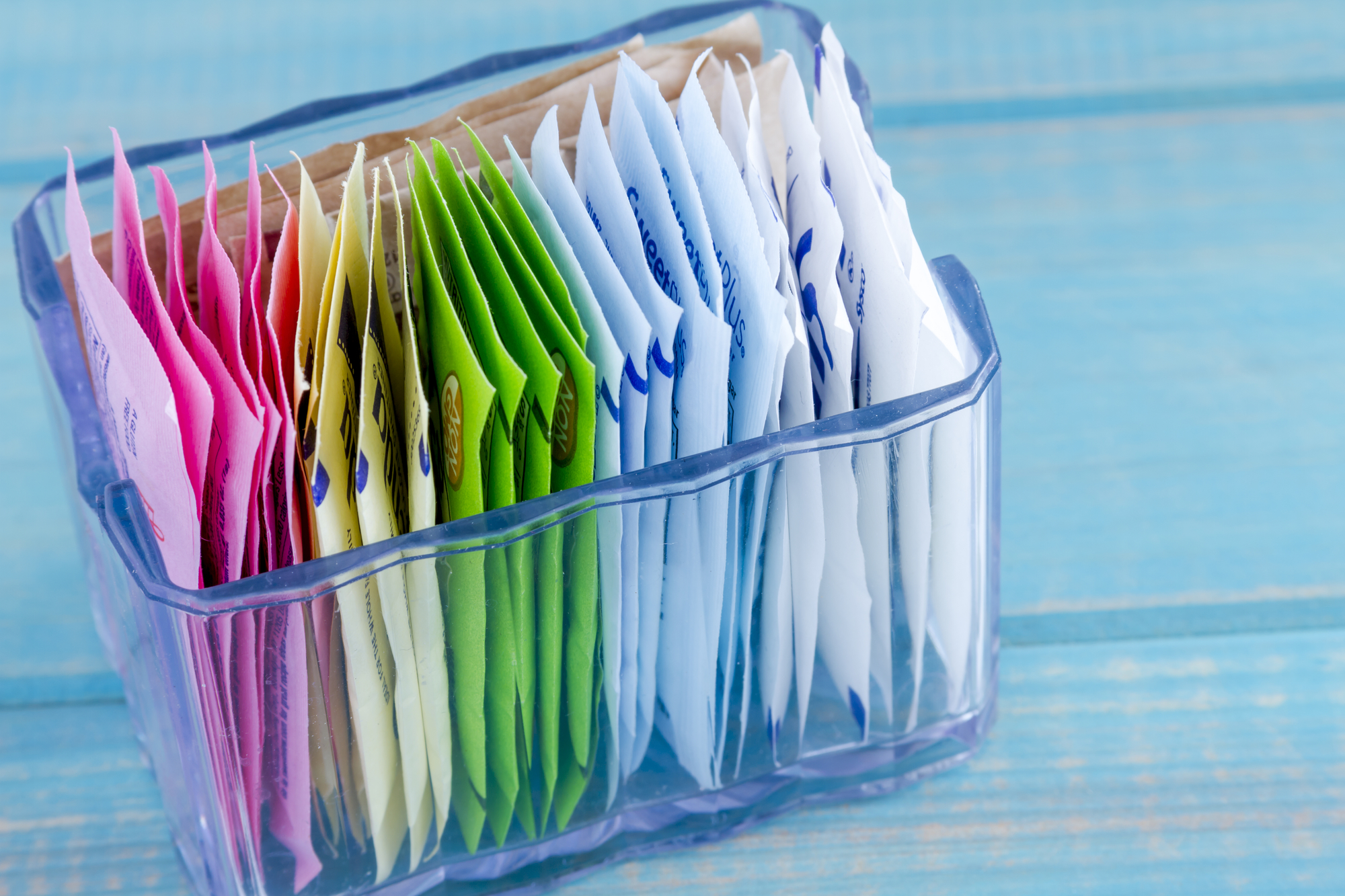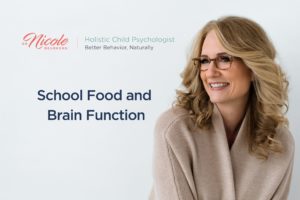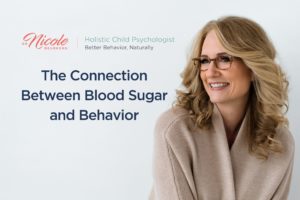Head to any aisle in the grocery store and you will find food and drink packages filled with sugar substitutes.
Promoted as beneficial alternatives to sugar, these chemicals have seeped into a wide range of processed food products over the last several decades. Why have artificial sweeteners and sugar substitutes become so prevalent in foods and beverages today?
The biggest issue seems to be backlash against sugar, as high sugar consumption has been linked to obesity, diabetes, irritability, inattention, hyperactivity, and more. While it is true that eating foods and beverages with added sugar can cause various mental and physical health problems, artificial sweeteners are not a safe substitute! These chemical sweeteners and sugar substitutes are used in products to provide the sweet taste people crave, without adding significant calories. They became popular in “diet” and “light” drinks, and have expanded to the point where they are now found in many food and beverage products – sometimes even alongside sugar.
It’s appealing to think that we can get the sugary flavor without the negative impact of added calories. However, research now shows that artificial sweeteners can cause or exacerbate numerous physical and mental health symptoms. In my practice I see many children who experience worsening of mood, anxiety, hyperactivity, impulsivity, foggy thinking, and behavior when they consume these sugar substitutes. Research also shows there are numerous physical health problems that can result from these chemicals, including increased weight gain (yes even though they are labeled “diet”), increased risk of diabetes, autoimmune problems, and more. These chemicals are actually many times sweeter than regular sugar, and cause disruption in the brain’s ability to regulate it’s desire for sweet things, as well as appetite and a sense of having enough (satiety). Therefore, people tend to consume much more than they would if they were consuming something with real sugar.
I can personally attest to the dangers of these chemicals, as I experience significant joint problems from drinking Diet Coke. In my 20’s (before I knew the things I know today about nutrition and health) I would drink 1-2 Diet Cokes a day. I started drinking it in college for the caffeine, and I mistakenly thought this was a better option than drinking regular Coke or other sugary sodas. As you well know if you’ve been a soda drinker for a while, it becomes a habit that is hard to break!
I went on drinking my 1-2 Diet Cokes a day for years, without awareness of the health problems it might be causing. When I was in my late 20’s, after the birth of my 2nd child, I began to have joint problems in my ankle. At first it was just annoying, but over the course of a few weeks the pain became very intense and started to spread. About 6 weeks after having my son the pain in my ankles was so intense I could barely walk. My knees, hips, and wrists were also painful. Multiple visits to physicians yielded a diagnosis of early-onset rheumatoid arthritis. I was told that I needed invasive testing and that I had to stop nursing my infant son so I could go on a regimen of high dose steroid medications that would be unsafe for him.
I was devastated, as I knew breastfeeding was best for him and had no desire to stop. I was also worried about what was going on with my health and what needed to happen to resolve the symptoms. In the midst of this my husband happened to hear something on a radio news show about aspartame and chronic joint pain. He shared the information with me and I figured I had nothing to lose by cutting out aspartame from my diet. I immediately stopped drinking Diet Coke, which was the main source of artificial sweetener in my diet at the time. Within days my joint pain began to slowly improve, and within 8 weeks my pain and movement issues were completely gone. My physician at the time told me that removing this from my diet would not work. However, when faced with the fact that my symptoms resolved as a result of removing aspartame he ended up telling me that I must have developed an allergy to the chemical. His only recommendation at that point was that I not consume aspartame. I was thrilled to have found the root cause of my symptoms, and to avoid high dose medications and associated side effects.
What I understand now, after many years of education on health and nutrition, is that I had an underlying issue brewing with inflammation in my body as a result of years of consuming Diet Coke and other unhealthy foods. It is likely that the physical stress and hormone changes associated with pregnancy and nursing simply was the last straw that tipped me over into full-blown symptoms. By cutting out the aspartame I was able to reduce the inflammation enough to get me significant relief from the immediate joint issues. Over time I’ve implemented many other nutrition and lifestyle changes that have reduced inflammation further and allowed me to avoid recurrence of joint symptoms. I am vigilant about reading labels now. I know almost immediately if I’ve accidentally consumed something with artificial sweeteners, as I get a headache and have achy ankles and wrists within an hour.
The reality is that I was having side effects of artificial sweetener consumption for years, but didn’t realize it until they became severe. You and your child may also be having symptoms such as headaches, irritability, insomnia, weight gain, brain fog, etc. that are related to consuming these chemicals, but you haven’t realized that was the trigger. As my personal experience shows, it’s worth trying to cut them out of your diet to see what improvements you may notice!
Since these chemicals can cause significant problems, and they have no real health benefit, it makes sense to eliminate (or at least reduce) them from your diet. Children are especially susceptible to the effects of these toxins, and it’s wise for parents to remove them to the greatest extent possible. I recommend that all children avoid consumption of artificial sweeteners, but especially children struggling with any learning, mood, anxiety, and/or behavior challenges. Removal of artificial sweeteners and sugar substitutes is a simple strategy that may improve symptoms, and at the very least supports your child’s physical health.
If you’re going to try to avoid these ingredients then you need to know what to look for on product labels. Obviously eating whole foods ensures you are not consuming these chemical sweeteners, but packaged/processed foods are another story. Here are some of the many names these chemical sweeteners go by. Read labels carefully to make sure you don’t see any of these in the products you buy:
acesulfame potassium
alitame
aspartame
aspartame-acesulfame salt
cyclamate
Dulcin
Equal
Glucin
isomalt
kaltame
mogrosides
neohesperidin dihydrochalcone
neotame
NutraSweet
Nutrinova
saccharin
Splenda
sucralose
Twinsweet
Sweet N Low
You need to be smart when reading labels, as companies try to trick consumers with sneaky labeling. A great example is a yogurt container I recently came across at the grocery store. The front of the label had “Contains No Aspartame” in big letters on the front. However, when I looked at the ingredients they had put 2 other artificial sweeteners in the yogurt – acesulfame potassium and sucralose! Companies are starting to realize that consumers are getting wiser about toxic ingredients such as Aspartame, so they advertise that they don’t use that specific ingredient. However, that does not mean that they are actually removing all these harmful sugar substitutes from their products. Don’t let their sneaky marketing tactics derail your efforts to provide healthier food options for your family!
Click here to check out a Facebook live video where I show you how many of these nasty chemicals are lurking in the foods you might be buying for your kids, and how to read labels so you can avoid them.
I’d love to hear your stories about artificial sweeteners, sugar substitutes, and improvements you’ve experienced after removing them from your and/or your child’s diet. Share your experiences in the comments below!
What You Should Do Next:
Sign up for my Better Behavior Naturally community newsletter
Sign up for my newsletter to get tips, resources, and supports to improve your child’s attention, anxiety, mood, and behavior…while making your job as a parent easier.
Enroll in one of my workshops
Check out one of my many workshops where you’ll join my exclusive community of parents in a one-of-a-kind virtual resource accessible 24/7. Whether you’ve got a child with a diagnosis like autism or ADHD, or are becoming more and more frustrated with a child who struggles to listen and cope, these workshops are designed to give you the information, tools, and support you need…whenever you need it.








